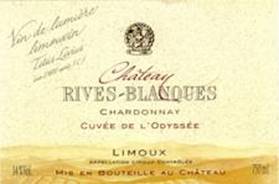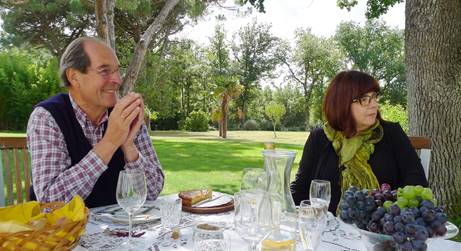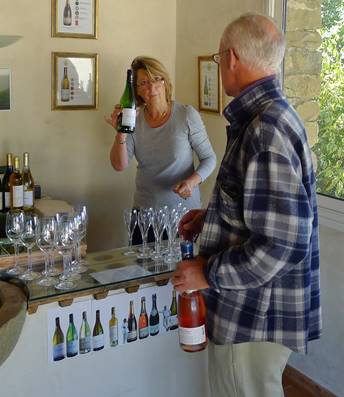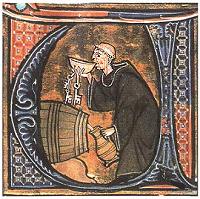|
While we no longer represent the excellent producer Château Rives-Blanques, I wanted you to know that their wondrous 2017 ‘Odyssée’ Chardonnay will be released by LCBO VINTAGES in their stores on Saturday, March 16th.
Still whites simply don’t get much better than those that come in the woefully under-appreciated AOC Limoux appellation of South-West France. But, the region and particularly this winery are very much worth knowing. As Jancis Robinson recently noted, “The Panman family go from strength to strength.”
|
|
2017 Odyssée - Chardonnay (13.0% Alc./Vol.) $26.95 the bottle
 Here’s how the LCBO describes the 2017 vintage in their VINTAGES March 16, 2019 release magazine: “Chardonnay does very well in Limoux; to many these are the finest Chardonnays produced in the Languedoc. This one is layered and complex, fresh and crisp, with impressive fruit and a sharp Chablis-like acidity and refined minerality. Try this with your favourite shellfish course or serve as a classy aperitif.” Here’s how the LCBO describes the 2017 vintage in their VINTAGES March 16, 2019 release magazine: “Chardonnay does very well in Limoux; to many these are the finest Chardonnays produced in the Languedoc. This one is layered and complex, fresh and crisp, with impressive fruit and a sharp Chablis-like acidity and refined minerality. Try this with your favourite shellfish course or serve as a classy aperitif.”
Here are all the technical details.
Try it, you’ll like it.
|
|
Château Rives-Blanques

|
|
Jan Panman and Hélène enjoying
an al fresco lunch at Château Rives-Blanques
|
Château Rives-Blanques is a gorgeous 30 hectare estate and winery located near Limoux, twenty minutes south of the medieval walled citadel of Carcassonne and within sight of the majestic Pyrénées. Caryl and Jan Panman acquired the property in 2001 and have invested heavily in the vineyards and winery ever since. They have adopted rigorous farming and wine-making practices and have assembled a highly-
skilled team of dedicated professionals, including consultant Pierre Roque and winemaker of thirty years Eric Vialade, in order to produce award-winning, world-class white and sparkling wines.
Château Rives-Blanques has long been known for being environmentally friendly and was among the first vineyards in France to be given the 'Agriculture Raisonnée' accreditation by the Ministry of Agriculture, confirming the ecological honesty and integrity of the way they grow their grapes and manage their lands. A happy combination of altitude (350 meters above sea level) and brisk summer winds lends a helping hand by keeping unwanted pests at bay - naturally. They never use chemical fertilizers and all vine cuttings, grape pips and skins left over from the pressing are ploughed back into the soil.

|
|
Caryl Panman and our old friend Graham Nutter
|
AOC Limoux
For centuries Limoux has produced white wines that sparkle naturally after a second fermentation. They became known as Blanquette de Limoux, Blanquette simply meaning ‘white’ in the Occitan language. Locals claim
that fermentation in the bottle was
developed here long before it was practised in Champagne; dating the production of cork-stoppered sparkling wines at the Abbey of St.-Hilaire from 1531.
 The order at the Abbey of St.-Hilaire was Benedictine. Dom (Pierre) Pérignon (1638-1715), who according to myth invented the méthode Champenoise, was a Benedictine monk and speculation has it that members of the order brought the secret with them when they migrated north. There is much debate over which area makes the best bubbly, but there can be no argument about which produces the best marketers … a bottle of the delicious Blanquette de Limoux from Château Rives-Blanques would be about $28.00, while a bottle of Moet & Chandon 2009 Dom Pérignon currently sells for $253.95 at the LCBO! The order at the Abbey of St.-Hilaire was Benedictine. Dom (Pierre) Pérignon (1638-1715), who according to myth invented the méthode Champenoise, was a Benedictine monk and speculation has it that members of the order brought the secret with them when they migrated north. There is much debate over which area makes the best bubbly, but there can be no argument about which produces the best marketers … a bottle of the delicious Blanquette de Limoux from Château Rives-Blanques would be about $28.00, while a bottle of Moet & Chandon 2009 Dom Pérignon currently sells for $253.95 at the LCBO!
In 1993 the AOC Limoux appellation was revised to include Chenin Blanc and Chardonnay in addition to the traditional Mauzac. Vinification in oak is mandatory. The region’s vineyards are so much higher, cooler and further from the Mediterranean influence than any other Languedoc appellation that the INAO authorities classify it as part of the Atlantic-influenced South-West France rather than as part of Languedoc-Roussillon. The traditional grape variety is the Mauzac, also called Blanquette, but increasing amounts of Chardonnay and to a lesser extent, Chenin Blanc have been recently planted.
|